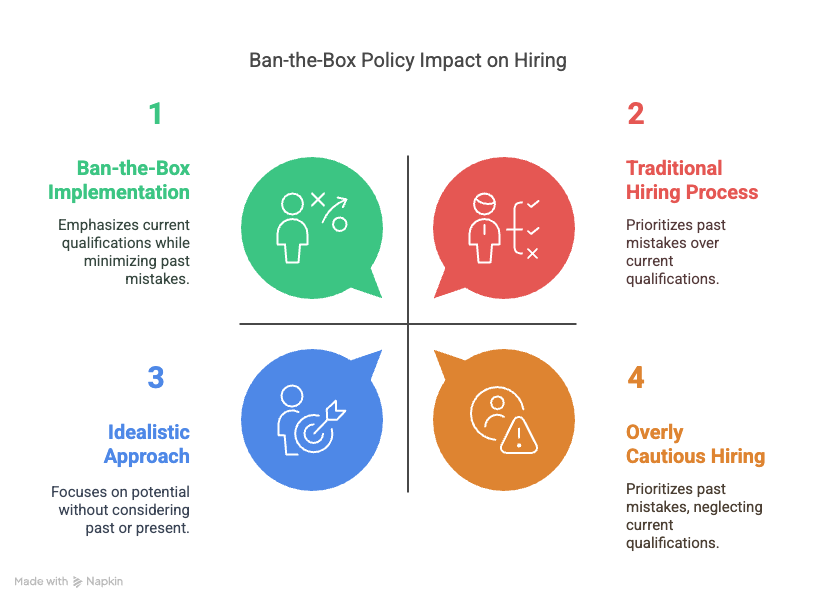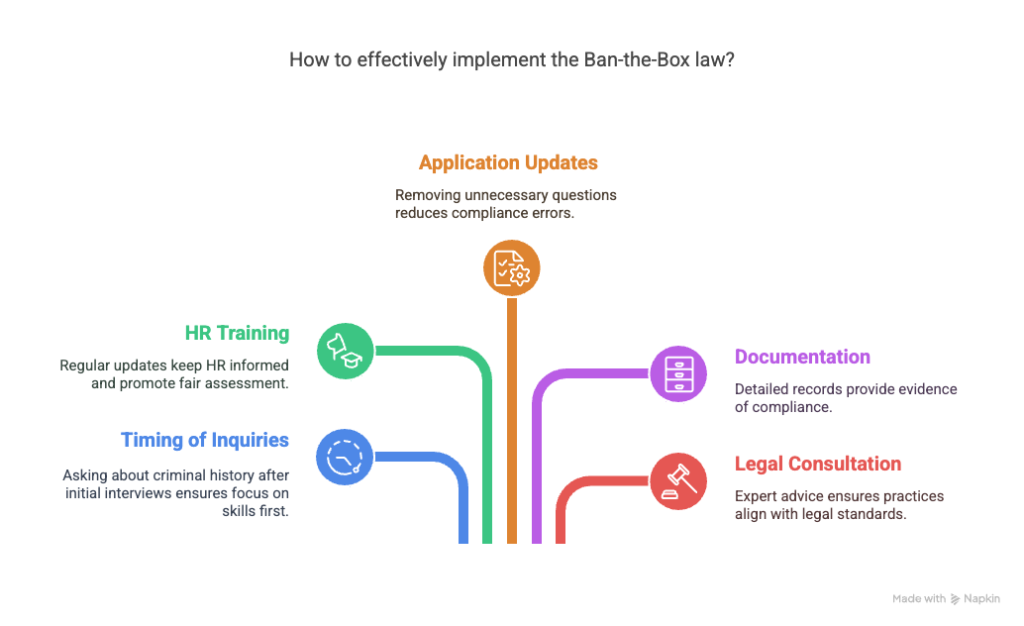Navigating the legal landscape of hiring can be daunting, especially with various state laws aimed at promoting fair hiring practices. North Carolina's Ban-the-Box law is a notable regulation addressing this, particularly for public sector employers. This comprehensive guide unpacks the essentials of the law, offering insight into compliance for public employers, and sheds light on the broader implications for job seekers and HR professionals.
Key Takeaways
- Ban-the-Box is a movement aimed at fair hiring by eliminating questions about criminal history from initial job applications, especially in North Carolina's public sector.
- The intention of North Carolina’s Ban-the-Box law is to allow individuals with criminal records an equal opportunity at employment by delaying any inquiry into their criminal backgrounds until later in the hiring process.
- The law specifically targets public sector employers, forbidding them from asking about criminal history on initial applications, although exceptions exist after the first interview or a conditional offer.
- Compliance requires public employers to revamp hiring processes, such as removing criminal history questions from applications and ensuring HR staff are trained on the law's specifics.
- This initiative not only complies with legal mandates but also promotes a more inclusive workforce by allowing candidates to be evaluated based on qualifications and skills instead of past mistakes.
Introduction
Ban-the-Box is a movement focused on fair hiring practices by removing barriers that confront individuals with criminal records. This initiative advocates not asking about criminal history on initial job applications, allowing candidates to be assessed on their skills and qualifications first. North Carolina's Ban-the-Box law targets public employers, pushing them to adopt fairer hiring processes.
The law was introduced to give people with criminal records a fair chance at employment by delaying inquiries into their criminal history until a later stage in the hiring process. This shift seeks to reduce discrimination and improve economic opportunities for those with past convictions. For public sector employers, understanding and complying with this legislation is crucial.
This guide aims to equip public sector employers with a clear understanding of North Carolina’s Ban-the-Box law, ensuring effective compliance and promoting fair hiring practices.
Understanding Ban-the-Box
Ban-the-Box is a policy initiative that aims to remove the checkbox asking about criminal history from job applications. Its roots trace back to a desire for equitable job opportunities, particularly for those with past criminal records. By delaying questions about criminal history, the movement seeks to provide all applicants a fair chance to present their qualifications without bias.
The rationale is straightforward: many individuals with criminal records face significant employment barriers. Data shows that about one in three American adults has a criminal record, which often leads to blanket exclusions from job opportunities. This policy is an effort to shift the initial focus from one's past mistakes to their current qualifications and potential as employees.
North Carolina embraced this movement by enacting its version of Ban-the-Box in December 2020. Specifically targeting public sector jobs, this law doesn’t eliminate background checks altogether. Instead, it defers them to later stages of hiring. When public employers evaluate a candidate without prior knowledge of their criminal background, it levels the playing field. This approach aligns with broader fair hiring practices, aiming to foster diverse and inclusive work environments.

Reflect on this: What would your employment process look like if you couldn't consider criminal history from the outset? Are you ready to place potential and skills above past mistakes? Understanding these aspects of Ban-the-Box propels you toward more just hiring practices.
Key Provisions of North Carolina’s Ban-the-Box Law
This section addresses the heart of North Carolina’s Ban-the-Box law, focusing on its application within the public sector. Let’s break down the key components you need to understand.
Scope and Applicability
The law targets public sector employers, including state agencies and any units of local government. If you’re in this space, you need to comply. Private employers, for now, are off the hook.
Prohibited Actions
Before you dive into a candidate’s criminal history, pump the brakes. You're not allowed to ask about a candidate's criminal record on the initial application. This means no checkboxes or pre-screening questions. The idea is to judge candidates first on their skills and experience.
Permissible Instances
There are exceptions. After the first interview or a conditional job offer, you can dig into the candidate's criminal history. Just make sure it’s relevant to the job. For instance, if the role involves handling money, a fraud conviction might matter.
Connection to Fair Hiring Practices
Ban-the-Box is not just about compliance. It’s about aligning with fair hiring principles. By focusing on qualifications first, you give people a fair shot, which could bring in diverse and valuable perspectives to your team.
Does this help you see where your organization fits into the broader goal of fair employment practices? Ensuring compliance with these provisions doesn't only keep your hiring process legal—it aligns you with a more inclusive workforce approach.
Compliance Requirements for Public Employers
Removing the criminal history checkbox on job applications is the first step toward compliance with North Carolina's Ban-the-Box law. As a public employer, you need to eliminate questions about an applicant's criminal record from your initial application forms. This simple action aligns your hiring practices with the law's intent to provide fair opportunities to all candidates.
Timing matters. You can only inquire into an applicant's criminal history after the initial stages of the hiring process. The law requires that you wait until the candidate is deemed qualified for the position before performing background checks. This ensures that all applicants are first evaluated based on their skills and experience, promoting a fairer selection process.
HR personnel must be well-versed in these procedures. Implement comprehensive training sessions to educate your team on the specifics of North Carolina's Ban-the-Box requirements. Update your employment policies to reflect these changes, ensuring that everyone involved in hiring is aware of and adheres to the new protocols.
Good record-keeping is essential. Document your compliance efforts meticulously. Keep detailed records of job postings, applications, and interview notes to demonstrate adherence to the Ban-the-Box law. These records can protect your organization from potential legal challenges and prove your commitment to fair hiring practices.
Challenges and Solutions in Implementation
You might find implementing the Ban-the-Box law straightforward at first glance, but common compliance issues can trip up even the best-intentioned employers. One frequent challenge is timing. When is the right moment to ask about a candidate's criminal history? Missteps can lead to unintentional violations, so getting this right is crucial.
Practical solutions exist. First, shift your inquiries to after the initial interview phase. This practice helps focus early screenings on skills and qualifications rather than background. Regularly updating HR training is vital. Ensure your HR team understands the law and its purpose. This goes beyond knowing the rules; it's about fostering a culture of fair assessment.
Updating job applications and removing unnecessary questions can significantly reduce compliance mistakes. Streamline processes and ensure your systems trigger background checks at legal, appropriate stages. Document every step meticulously. Detailed records provide evidence of compliance and protect against potential disputes.
Consider creating a Q&A document or intranet page that clearly outlines procedures. This resource should be easily accessible to hiring managers and other relevant team members, reinforcing the importance of following legal protocols.

You may also want to work with legal experts or consult compliance professionals to review your practices regularly. They can offer insights that are specific to your organization's needs or identify areas for improvement.
What strategies are you currently using to tackle these challenges? Reflect on what’s working and what could be refined. Effective implementation transforms a legal obligation into an opportunity for fairness and growth within your organization.
Implications for Job Seekers with Criminal Histories
The Ban-the-Box law in North Carolina offers a crucial opportunity for job seekers with criminal records. By postponing inquiries into criminal histories, this law ensures that candidates are assessed on their skills and qualifications first. This shift opens doors for individuals who might have been excluded from consideration at the outset. It allows them a chance to demonstrate their capabilities during interviews before any potential issues from their past are discussed.
Once the interview process is underway, candidates should expect background checks to occur only after a conditional offer is made. This timing is strategic, as it means the applicant has already demonstrated their fit for the role. It’s essential for candidates to be honest and prepared to discuss their history if asked, framing their past in a context of growth and rehabilitation.
For more resources on navigating this process and understanding your rights, consider visiting the Professional Background Screening Association (PBSA). They offer valuable insights and guidance on fair hiring practices, helping you to better present yourself in the job market.
The Broader Impact: A Move Toward Fair Hiring
North Carolina's Ban-the-Box law exemplifies a shift in how we view employment eligibility. By delaying inquiries into criminal histories, the law aims to provide a fair shake for all candidates, promoting a more inclusive hiring process. This practice discourages early discrimination against those with past infractions, allowing employers to focus first on qualifications and skills.
The cultural shift toward inclusivity influences more than just public employment. As companies recognize the value of diverse backgrounds, they might voluntarily adopt similar practices. This shift reflects a growing awareness of the potential contributions individuals with criminal records can make when given a chance. It encourages a broader reconsideration of hiring norms.
As we look to the future, consider how this movement could expand. Could private sector employers follow suit? Might we see even more comprehensive fair hiring regulations across other states? The trajectory suggests ongoing change and adaptation, moving toward a system that values merit and individual potential over past mistakes.
By continuing this trend, you, as an employer, can play a part in fostering a more equitable job market. Engaging with these practices not only contributes to legal compliance but also enriches workplace culture, reflecting a commitment to fairness and inclusivity.
Conclusion
North Carolina's Ban-the-Box law presents a unique opportunity for public employers to reflect on their hiring practices. By removing the checkbox for criminal history on initial job applications, they affirm their commitment to assessing candidates based on qualifications and skills rather than past mistakes.
The law's primary focus is to enhance fairness in hiring. This shift requires employers to rethink traditional practices and update them to align with modern values of equity and inclusivity. As a public employer, this means actively engaging in policy updates and training efforts to ensure compliance and better candidate experience.
Adopting these changes can pave the way for a more inclusive workforce. It sends a powerful message that past errors don't define an individual's ability to contribute meaningfully. Public employers have a responsibility to lead in this area, setting an example for others to follow. The challenge lies not just in adhering to legal mandates but also in fostering an environment where second chances are genuinely valued.
For public employers, the obligation to comply with the Ban-the-Box law also includes maintaining accurate documentation. Keeping thorough records not only demonstrates compliance but also underscores a commitment to transparency and fairness. It helps reinforce trust with candidates who may be apprehensive about disclosing their past.
Ultimately, embracing North Carolina's Ban-the-Box requirements moves public employers toward fairer hiring practices. When these changes are made with intention and care, they contribute significantly to building workplaces where all individuals have a fair chance at employment, regardless of their history. This is not just about meeting legal obligations; it's about participating in the march toward equality and justice in the workplace.
Frequently Asked Questions (FAQs)
Does NC Ban-the-Box apply to private employers?
No, the Ban-the-Box law in North Carolina applies only to state agencies and not private employers.
When can state agencies ask about criminal history in NC?
State agencies can inquire about criminal history after making a conditional offer of employment.
What jobs are exempt from NC Ban-the-Box?
Certain positions that involve public safety or require statutory restrictions may be exempt from the Ban-the-Box rule.
How to update state job applications for compliance?
Remove questions about criminal history from initial applications. Include a statement that such inquiries will take place post-offer.
Are misdemeanors covered under NC Ban-the-Box?
Yes, misdemeanors are included under the Ban-the-Box policy and should not be asked about until a conditional offer is made.
Can state employers rescind offers based on records?
State employers can rescind offers if the criminal history directly conflicts with the job’s responsibilities.
Do NC schools follow Ban-the-Box?
Yes, state-operated educational institutions must comply with the Ban-the-Box requirements.
How to handle disclosures after a conditional offer in NC?
After a conditional offer, you can discuss criminal history but ensure it's relevant to the job responsibilities.
What penalties exist for violating NC Ban-the-Box?
Penalties can include complaints and investigations by the Office of State Human Resources, but specific fines or legal actions are not detailed.
Does NC Ban-the-Box apply to contractors?
No, the rule does not apply to contractors or private entities contracting with the state.
Do federal jobs in NC follow Ban-the-Box?
Federal jobs are governed by separate federal guidelines and are not affected by North Carolina's Ban-the-Box policy.
How do applicants know if a job is exempt from Ban-the-Box?
Job postings should clearly indicate if a position is exempt and explain why criminal history is relevant.
Can applicants appeal a rescinded offer?
Yes, applicants may engage in a review process if an offer is rescinded due to criminal history.
Do municipalities in NC adhere to Ban-the-Box?
Only state agencies are required to follow this rule. However, some municipalities may choose to adopt similar practices.
Definitions
Fair Hiring Practices
Hiring methods that prioritize evaluating a candidate’s current qualifications and abilities instead of focusing on personal history, such as past criminal records. These practices minimize bias and open opportunities for people who may otherwise be excluded early in the process. They're especially useful when trying to create an inclusive and diverse workplace.
Background Check
A process used by employers to verify a candidate’s history, including criminal records, work experience, and education. In the context of Ban-the-Box, background checks are delayed until after the initial stages of the hiring process to ensure fair treatment. Ask yourself: At what stage in hiring do you currently conduct these checks?
Conditional Offer
An official job offer made to a candidate that depends on specific requirements being met, such as passing a background check. This step happens after interviews and initial evaluations, giving candidates a chance to be considered on their merits first. It's a common and legal way to handle sensitive information later in the process.
Public Sector Employer
An organization run by the government, such as a state agency, school district, or municipality. North Carolina’s Ban-the-Box law applies specifically to these employers, requiring them to adjust their hiring practices in line with the law. If you work for one, you need to follow specific compliance steps.
Job Application
A form used by candidates to express interest in a role and share their qualifications with an employer. Under Ban-the-Box, public employers must remove any questions about criminal history from this initial document. Review your application forms—do they meet current legal standards?
References
- Southern Coalition for Social Justice, "Ban the Box Community Initiative Guide": https://southerncoalition.org/resources/ban-the-box-community-initiative-guide/
- National Employment Law Project, "Ban the Box: U.S. Cities, Counties, and States Adopt Fair Hiring Policies": https://www.nelp.org/insights-research/ban-the-box-fair-chance-hiring-state-and-local-guide/
- Congressional testimony, "The Benefits of Ban the Box": https://www.congress.gov/116/meeting/house/109189/documents/HMKP-116-GO00-20190326-SD013.pdf

GCheck Editorial Team
Meet the GCheck Editorial Team, your trusted source for insightful and up-to-date information in the world of employment background checks. Committed to delivering the latest trends, best practices, and industry insights, our team is dedicated to keeping you informed.
With a passion for ensuring accuracy, compliance, and efficiency in background screening, we are your go-to experts in the field. Stay tuned for our comprehensive articles, guides, and analysis, designed to empower businesses and individuals with the knowledge they need to make informed decisions.
At GCheck, we're here to guide you through the complexities of background checks, every step of the way.





